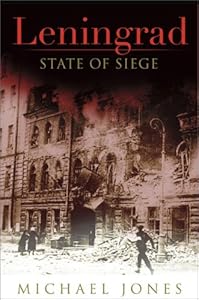book report: Leningrad, State of Seige by Michael Jones (2008)
There's no better cure for a fat, lazy summer than a book that will chill your very soul. Reading about the siege of Leningrad in WW2, from summer 1941 to January 1944, will make you shiver through their winter without fuel, and feel guilty for eating another hamburger while hundreds
As usual, those with weaker morals did better than those with strong morals. Bread was stolen from children. Bread was bartered for many vices. When bread could not be found, human flesh was turned to, either by murder or by cutting from the dead. Those in charge of distribution, the leaders who were responsible for the citizens, never knew hunger. Meanwhile, those with morals banded together, survivors who cared for each other. Of interest to me is one account of someone who called out to God and was answered. A woman was betrayed by her neighbor and was left without food for her children.
The author has deep affection for this city. He does not write as a clinical observer, but as a friend with a broken heart, yet proud. He is glad Leningrad outlasted the Nazis. He rejoices with Leningraders today. This is a tragic book. the suffering portrayed is immense and depressing. It needs to be faced though. We need to be reminded, I need to be reminded, how shallow our morality is. Character is only known when temptation is resisted. When all hell breaks loose, and the fetters of civilization are thrown off, hell is usually freed internally as well.
 Cover of Leningrad: State of Siege
Cover of Leningrad: State of Siege
As usual, those with weaker morals did better than those with strong morals. Bread was stolen from children. Bread was bartered for many vices. When bread could not be found, human flesh was turned to, either by murder or by cutting from the dead. Those in charge of distribution, the leaders who were responsible for the citizens, never knew hunger. Meanwhile, those with morals banded together, survivors who cared for each other. Of interest to me is one account of someone who called out to God and was answered. A woman was betrayed by her neighbor and was left without food for her children.
It was not possible to survive without food and Okhapkina became almost crazy with distress, as her fears for her children overwhelmed her. She had no idea what to do. Then suddenly, she got out of bed, and flung herself on to her knees. 'I had no icons,' Okhapkina related, 'and I didn't know any prayers.My children had never been christened, and I didn't believe in God. I would sometimes cry out: "Save us - God don't let us die," during an air raid. But that was it. Yet now i desperately wanted to appeal for help.'How many other prayers did God answer during that siege? How many did he not answer? That's the problem of evil. But God did answer her prayer. God does answer prayer. God does hear the cries of the orphans and widows. I'm digressing.
Words began to tumble out. Fearful of waking her children, Okhapkina whispered: 'God, you can see how I'm suffering - how hungry my little children and I are. I can't go on any more. God, if we are to die, could we all die together?' She was utterly desparate. 'I can't live any more - the suffering is too much.' And then, amid all the distress, something came to her. She began to recite a simple formula: 'Have mercy, God, on my innocent children.'
Early the next morning, she was woken by a loud banging at the front door. A voice called out, asking if Lidiya Okhapkina lived there. It was a Red Army soldier, carrying a parcel from her husband, who was serving at the front. He was fighting jundreds of miles away - and Okhapkina had not heard news from him for months. But now he had sent his familya kilogram of semolina, a kilogram of rice and two packets of biscuits. pp. 206-7
The author has deep affection for this city. He does not write as a clinical observer, but as a friend with a broken heart, yet proud. He is glad Leningrad outlasted the Nazis. He rejoices with Leningraders today. This is a tragic book. the suffering portrayed is immense and depressing. It needs to be faced though. We need to be reminded, I need to be reminded, how shallow our morality is. Character is only known when temptation is resisted. When all hell breaks loose, and the fetters of civilization are thrown off, hell is usually freed internally as well.
![Reblog this post [with Zemanta]](http://img.zemanta.com/reblog_e.png?x-id=74fc688b-fb16-4188-8fee-5f66772a06e3)


Comments